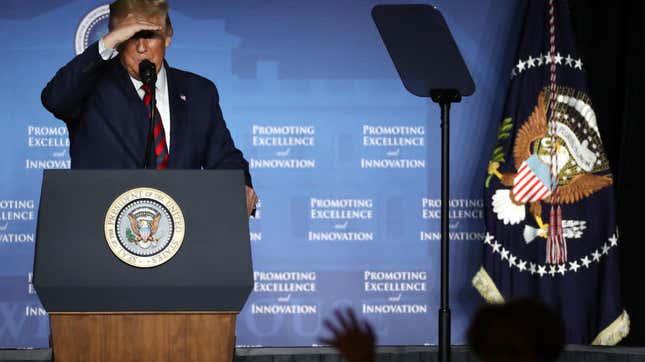
Donald Trump, addressing leaders of the nation’s HBCUs on Tuesday, pledged to be a force for “strengthening” historically black colleges and universities, as HBCU leadership often find themselves working to separate the messaging on money for their schools from the often divisive rhetoric of the man himself.
“I think it’s important to stay focused on the money and not on the message,” Austin Lane, president of Texas Southern University, told Politico. “We’re here to find out, most importantly, if there’s money to access, where is it and how do we get it.”
That appeared to be the point for many HBCUs, which, on average, as Politico notes, rely on federal dollars for about half of their operating revenue.
Thus, despite concern from constituents that they may be getting too cozy with an administration that polls in the single digits among African Americans, school administrators say they must work with whoever is in the Oval Office in order to keep their doors open.
“With every administration, we pledge to work well,” Katara Williams, chief of staff for the Southern University system, told Politico. “Any advancement that we can get in terms of providing additional access through scholarships or grants...we’re very grateful.”
And so it was that HBCU representatives were in attendance in Washington, D.C., for Trump’s speech at the National Historically Black Colleges and Universities Week Conference.
Touting his “fierce dedication to strengthening HBCUs,” Trump said his “administration’s commitment is bigger and better and stronger than any previous administration by far.”
He, not surprisingly, also got in a campaign push, pointing out his usual “black stats” regarding what he said were record low poverty and unemployment rates for African Americans.
“That’s something,” he remarked regarding the statistics he provided, according to U.S. News & World Report. “I don’t know, when I’m on that debate stage with whoever I’m on [there with], these are pretty good numbers. Who is going to beat me? Tell me.”
HBCU leadership struggle with managing a relationship with the Trump administration.
On one hand, as U.S. News notes:
under the Trump administration, federal funding for HBCUs has increased by more than $100 million over the last two years, a 17% increase since 2017.
While HBCU officials have welcomed the funding, they’ve also been quick to point out that White House efforts to decrease funding for other federal programs like work-study and college counseling for low-income students and to eliminate the Supplemental Educational Opportunity Grants – though unsuccessful – would have canceled out any good done by increased institutional funding.
However, the HBCUs also had a sometimes strained relationship with the administration of President Barack Obama, which they blamed for changes in access to federal Pell grants that hurt them financially.
They also were not appreciative of an administration that seemed more interested in improving educational outcomes in the K-12 grades than at the college level, as U.S. News explains.
HBCU leadership said their focus must remain on supporting their institutions and not on the politics of the moment.
As Anthony Jenkins, president of West Virginia State University, told Politico, Trump’s support: “Is one part of a piece of pie. It is one sliver of what needs to be done. It’s going to take a comprehensive, joint effort.”

